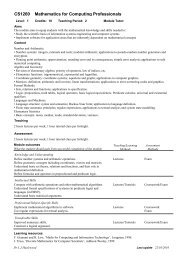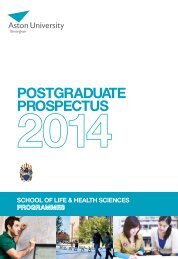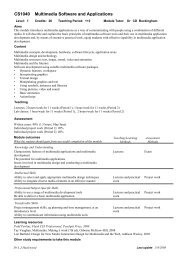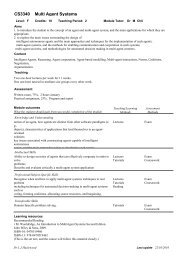Postgraduate ProsPectus - Aston University
Postgraduate ProsPectus - Aston University
Postgraduate ProsPectus - Aston University
You also want an ePaper? Increase the reach of your titles
YUMPU automatically turns print PDFs into web optimized ePapers that Google loves.
School of Engineering & Applied Science<br />
Power Engineering and Power Electronics Group<br />
School of Engineering & Applied Science<br />
Polymer and Advanced Materials Research Group<br />
Group overview<br />
The Power Engineering and Power Electronics Group<br />
undertake research into theoretical and practical<br />
aspects of power electronics and in particular its<br />
impact on electrical power networks primarily at the<br />
distribution level. The group has extensive links to<br />
industry and undertakes undergraduate teaching<br />
(primarily foundation degree) to major Power Utilities.<br />
Research interests<br />
We are interested in supervising projects in the areas of:<br />
Smart Grid Systems – especially applied to LV<br />
Distribution Systems<br />
HVDC – topologies, control and systems<br />
Battery energy storage – impact on networks and<br />
converter technologies<br />
Power electronics – industrial and transportation<br />
applications.<br />
Current Projects<br />
Power electronic converters for smart grid LV<br />
networks (Case Award with WPD)<br />
Inverter connected battery technology for network<br />
benefits (EPSRC)<br />
Multi-level power converters for HVDC applications<br />
(Case Award with Alstom Grid)<br />
Project FALCON (Tier 2 LCNF with WPD).<br />
Specialist equipment<br />
The Group’s laboratory facility is equipped with<br />
purpose-built power supplies, LeCroy high-speed<br />
oscilloscopes and probes, Agilent network/impedance<br />
analyser and DSpace and OPAL-RT rapid prototyping<br />
systems for power engineering research work.<br />
Funding sources<br />
The group has been funded from EPSRC, TSB (KTP<br />
programme), Case Awards and from companies<br />
including Alstom Grid, WPD and E.ON UK.<br />
Collaboration<br />
The group has existing partnerships with a growing<br />
number of utility companies and specialist suppliers to<br />
the power industry, including National Grid, E.ON UK,<br />
WPD and Alstom Grid.<br />
Application and contact<br />
Research Group Convenor<br />
Dr. Andrew Cross<br />
T: +44 (0)121 204 3731<br />
F +44 (0)121 204 3676<br />
E: a.m.cross@aston.ac.uk<br />
W: www.aston.ac.uk/eas/research/groups/pepe<br />
Group overview<br />
The Group is a leading broad-based polymer<br />
research group of national and international standing<br />
with expertise in basic and applied multidisciplinary<br />
research into polymers and biomaterials; from novel<br />
design and synthesis, to melt processing and the role<br />
of specialty additives and antioxidants, through to their<br />
performance in service for industrial, biological and<br />
medical applications. The activities of the Group are<br />
delivered through three Research Units:<br />
Advanced Materials Research Unit (AMRU)<br />
Biomaterials Research Unit (BRU)<br />
Polymer Processing and Performance Research<br />
Unit (PPP).<br />
Research interests<br />
The research activities of the group focus on three<br />
main areas: design and development of biomaterials,<br />
synthesis of polymers, and processing, performance<br />
and applications of polymer materials.<br />
AMRU is concerned with the design and synthesis<br />
of bespoke monomers and controlled polymerisation<br />
for production of novel materials with applications in<br />
solar cell technology, drug delivery, cellular delivery,<br />
sensors and polymeric ligands for nanoparticles.<br />
BRU focuses on the synthesis and behaviour<br />
of biocompatible and biomimetic polymers and<br />
analogues of biological fluids such as tears, lung<br />
surfactant and synovial fluid, and on the design and<br />
fabrication of new soft tissue analogues for biomedical<br />
applications.<br />
PPP deals with a broad range of cross-disciplinary<br />
topics related to polymer durability, degradability and<br />
performance including antioxidant chemistry and<br />
reactive processing and modification of polymers,<br />
blends and nanocomposites.<br />
Application and contact<br />
Research Group Convenor<br />
Professor Sahar Al-Malaika<br />
T: +44 (0)121 204 3372<br />
F +44 (0)121 204 3679<br />
E: s.al-malaika@aston.ac.uk<br />
W: www.aston.ac.uk/eas/research/groups/polymer<br />
Current projects<br />
Synthesis of polymers for irreversible<br />
immobilisation and stabilisation of quantum dots<br />
Synthesis and evaluation of polymer beads for<br />
cellular delivery<br />
Spin-coating mechanism of photoactive polymer<br />
blends and copolymers<br />
Improving the lifetime and efficiency of organic<br />
solar cells<br />
Nanofibrous membranes for water purification<br />
Mechanistic studies of polychloroprene<br />
crosslinking, using controlled polymerisation and<br />
spectroscopic analysis<br />
The synthesis and in vivo performance of<br />
ophthalmic biomaterials<br />
The development of novel biomimetic surfactant<br />
systems<br />
Injectable soft tissue analogues for bodily repair<br />
and regeneration<br />
Vitamin E antioxidant in orthopaedic implants<br />
Non-migratory antioxidants for polymers in<br />
human-contact applications<br />
Stabilisation of polymers by natural (rosemarybased)<br />
antioxidants<br />
Biopolymer-based nanocomposites: performance<br />
and durability<br />
Reactive melt processing and stabilisation of<br />
polymer-clay nanocomposites<br />
Degradable polymers: mechanistic role of additives<br />
and nanoclays in TPUs.<br />
Specialist equipment<br />
The Group has extensive facilities for polymer<br />
synthesis and characterisation, state-of-the-art<br />
polymer melt processing, testing and analytical<br />
facilities including extruders and moulding machines,<br />
accelerated environmental exposure and ageing<br />
devices, thermal, mechanical, spectroscopic<br />
and chromatographic equipment. State of the art<br />
facilities are available for biological and biochemical<br />
characterisation of biomaterials performance.<br />
Funding sources<br />
The Group has a continuous stream of funding from<br />
a broad range of sources including the EU, national<br />
and international companies, EPSRC, BBSRC, Royal<br />
Society and Government bodies, for funding of<br />
studentships and research fellowships.<br />
Collaboration<br />
The Group has a large network of international and<br />
national collaborators from industry, research institutes<br />
and universities in the UK, EU, USA, Australia and Asia.<br />
60 To find out more: Telephone: +44 (0)121 204 3400 | Email: engineering@aston.ac.uk | www.aston.ac.uk/eas<br />
www.aston.ac.uk<br />
61
















